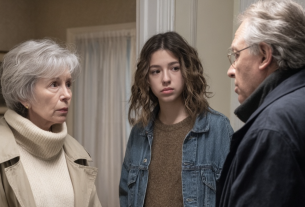“A swamp?” Marina slowly turned away from the stove where potatoes were frying for dinner.
“This ‘swamp’ fed your mother for twenty years while she was running around to doctors. Did you forget?”
“What does my mother have to do with it? Don’t you dare drag her into this!”
“It has everything to do with her, Vitya. While you were off in the capital doing your ‘big deals,’ I was here with your paralyzed mommy. Changing her diapers, in case you don’t remember.”
Vitya stood in the doorway of their two-room Khrushchev-era apartment, in a new suit with a suitcase at his feet. Marina hadn’t seen him look this good in a long time—fit, tanned, smelling of expensive cologne. Not like before, when he used to come home from the factory covered in machine oil.
She remembered how they met. The dances at the plant club, him—a young mechanic, her—from accounting. He spun her around to “A Million Scarlet Roses,” whispering nonsense in her ear. And then a modest wedding, about thirty guests, Olivier salad and Soviet champagne. His mother-in-law had cried with happiness then, hugging Marina: “Thank you, my girl, for taming my little Vitenka.”
Tamed him. They had lived together for twenty-two years. Raised a daughter, Lenka. Now she was studying at medical school, living on her scholarship and her mother’s side jobs. Vitya hadn’t given them any money for the last three years—he invested everything in “business.” What business—Marina never really understood. First he wanted to open a car repair shop, then he was into cargo hauling. Everything went under.
“You just don’t understand,” Vitya nervously lit a cigarette right there in the hallway. “Sergey suggested I move to Moscow. He has a chain of car washes there, he’ll take me on as a manager. He’ll rent an apartment for us at first.”
“You’re going alone?” Marina wiped her hands on her apron. Her hands were trembling, but her voice stayed steady.
“Not alone.” Vitya looked away. “With Alena. She… she understands me. She believes in me.”
Alena. Marina had known about her for about three months. She’d seen their messages on his phone while Vitya was in the shower. “Kitten,” “bunny,” “I miss you.” Her “kitten” was twenty-eight. A manager at the car dealership where Vitya had been eyeing a car. On credit, by the way, a credit Marina was still paying off from her teacher’s salary.
“And what about Lenka?” Marina asked. “Your daughter. She’ll be defending her diploma in a year.”
“She’ll grow up, she’ll understand. I can’t live like this anymore. I’m forty-five, Marina. I’m still young, I can still change everything.”
Marina walked over to the window. In the yard, their neighbor Zinaida was hanging laundry. She saw Marina at the window and waved. Zinaida knew everything. She knew about Alena, and that for the last six months Vitya had only been coming home to sleep. She pitied Marina in that neighborly way, bringing pies: “Hang in there, Marinka.”
“Remember,” Marina said quietly, “when Lenka got sick at five? Pneumonia, the doctors had given up. You were working nonstop then to earn money for the medicine. And I sat by her bed around the clock. You told me then, ‘We’re a family, Marina. We’ll get through anything.’”
“That was a long time ago.”
“Just fifteen years. Or when your mother had her stroke? Who ran with her from hospital to hospital? Who stayed up all night, turning her every two hours so she wouldn’t get bedsores? I did, Vitya. And where were you? Off ‘earning money’? Doing what, exactly, Vitya? You haven’t really worked anywhere properly for the last five years. You’ve been chasing your big break.”
Vitya stubbed his cigarette out on the windowsill. Marina winced—the new windowsill, they’d had it put in last month. She’d saved up for it herself.
“You always remember everything,” he snapped irritably. “You remember only the bad. And the good? What about when I took you to the sea?”
“Ten years ago you took me. To Anapa. For a week.”
“Nothing is ever enough for you!”
Marina turned to him. Tears were burning in her eyes, but she didn’t let them fall. He wouldn’t get that satisfaction.
“You know what, Vitya? Get out. Go to your Alena. Just let me tell you something first. I took care of your mother till the very end. Two years she lay here with us, two years I fed her with a spoon, washed her, gave her medicine. And where were you? Off earning? Earning what, Vitya? You haven’t really held a steady job for the last five years. You were just dreaming of getting rich.”
“I tried! I was doing it for the family!”
“For the family?” Marina gave a short laugh. “Lenka is in her final year and works night shifts as a nurse so she can afford textbooks. Because her daddy decided to become a businessman. I’ve taken on two full-time teaching loads at school and I tutor on top of that. Who exactly were you doing it for?”
Vitya was silent, his hand gripping the handle of the suitcase.
“And you know what’s funniest?” Marina went on. “Before she died, your mother said to me, ‘Forgive him, my girl. He’s weak. He’s always been weak. Thank you for putting up with him.’ I didn’t understand then. But now I do.”
“Don’t you dare!” Vitya exploded. “Don’t you dare call me weak! I’m suffocating here, that’s all! In this apartment, in this city, with you! You’re going to drive me to the grave with your righteousness!”
“My righteousness?” Marina suddenly laughed. Dry, bitter. “These past years all I’ve done is keep my mouth shut. I kept quiet when you came home drunk. I kept quiet when money disappeared from our stash—for your next ‘project.’ I kept quiet when you reeked of some other woman’s perfume. I thought you’d get it out of your system, come to your senses. We’re a family, after all.”
She went to the wardrobe and took out a folder. Vitya tensed.
“What’s that?”
“Divorce papers. I had them drawn up a month ago. I was just waiting for you to make up your mind. Or for me to. But you were the first to pack—good for you. Sign.”
Vitya stared at the papers in shock.
“You… you knew?”
“I’m not stupid, Vitya. I just gave you a chance. And I gave myself a chance—to be wrong, maybe. I wasn’t.”
“The apartment…” he began.
“The apartment is mine. It was registered to my mother and I inherited it. You’re registered here, but you have no ownership rights. You can try your luck in court, but here’s the snag—you haven’t had an official job for the last three years. Will you be paying alimony for Lenka?”
“She’s an adult…”
“A full-time student. She’s entitled to support until she finishes her studies. Article 85 of the Family Code, if you’re interested.”
Vitya grabbed the pen and scrawled his signature across the documents. He flung the folder on the side table.
“Happy now? Twenty-two years down the drain?”
Marina looked at him closely. Gray at the temples, wrinkles by his eyes. Once, he had been the man she loved. Once, he had been her own. And now—a stranger. Completely a stranger.
“Not down the drain, Vitya. We have a wonderful daughter. Smart, kind, hard-working. She takes after me,” she smiled sadly. “And thank you for these years. There were good moments too. You just took a wrong turn somewhere. Or maybe you were always like this, and I just didn’t see it.”
Vitya picked up the suitcase. He stood for a moment in the doorway.
“You’ll regret this. You’ll end up alone.”
“I won’t. I have Lenka. My job. Friends. And you know what? I’m finally going to sign up for dance classes. I always dreamed of learning tango. You used to laugh and say cows can’t dance tango. We’ll see.”
Vitya slammed the door. Marina stood in the silence for a moment, then went to the kitchen. The potatoes had burned. She dumped the pan into the sink and opened the window to air the place out.
The phone rang. It was Lenka.
“Mom, how are you? Zinaida Petrovna called, she said dad left with a suitcase.”
“I’m fine, sweetheart. Will you be home for dinner?”
“Mom… are you crying?”
“No,” Marina really wasn’t crying. “I’m chopping onions. Making a salad.”
“I’m coming over. I’ll come straight after my shift.”
“No need, Len. You have an exam tomorrow.”
“Mom, don’t be silly. I’m already on my way. And Mom… I love you. You’re the strongest person I know.”
Marina hung up. She took a bottle of wine from the fridge—a Teacher’s Day gift she’d been saving for a special occasion. She poured half a glass and raised it to the window, where the setting sun was gilding the rooftops.
“To a new life,” she said to herself.
Down in the yard, a taxi door slammed. Vitya was loading in his suitcase, and a young blonde was waving at him from the car. Alena. Marina had seen her a couple of times by the dealership—nothing special. Just young.
Zinaida called up from below:
“Marinka! I’m bringing you a pie! With cabbage, just how you like it!”
Marina smiled. For the first time in months, she smiled sincerely. On the table lay the divorce papers, and beside them the bunch of keys Vitya had left behind. She picked up the keys, weighing them in her hand.
Tomorrow she would go and change the locks. And sign up for dance lessons. And maybe go to the hairdresser’s—she’d long wanted to get a bob.
And tonight she would drink wine with Zinaida, eat pie and not think about what lay ahead. Because what lay ahead was life. Her life. Without looking back at the one who had betrayed her.
The phone rang again. An unknown number.
“Marina Sergeevna? This is the dean’s office of the medical institute. Your daughter has been nominated for a special named scholarship. Congratulations! Lena is our pride!”
Marina finally cried. But these were good tears.



